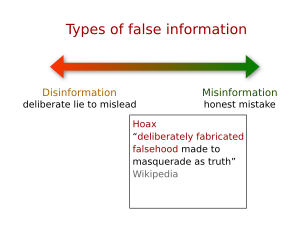Disinformasi

Disinformasi adalah informasi palsu yang sengaja disebarkan untuk menipu.[1][2][3] Disinformasi adalah bagian dari misinformasi, yang mungkin juga tidak disengaja.
Kata bahasa Inggris disinformation adalah pinjam terjemah dari kata bahasa Rusia dezinformatsiya,[1][2][3] berasal dari nama sebuah departemen propaganda hitam KGB.[4] Joseph Stalin menciptakan istilah itu, memberinya nama yang terdengar seperti bahasa Prancis untuk mengklaim itu berasal dari Barat.[1] Penggunaan istilah ini oleh Rusia dimulai dengan "kantor disinformasi khusus" pada tahun 1923.[5] Disinformasi didefinisikan dalam Ensiklopedia Soviet Besar (1952) sebagai "informasi palsu dengan maksud untuk menipu opini publik".[1][2][6] Operasi INFEKTION adalah kampanye disinformasi Soviet untuk memengaruhi pendapat bahwa AS menciptakan AIDS.[1][6][7] AS tidak aktif melawan disinformasi hingga 1980, ketika sebuah dokumen palsu melaporkan bahwa AS mendukung apartheid.[8]
Kata disinformation tidak muncul dalam kamus bahasa Inggris hingga akhir 1980-an.[1][2] Penggunaan dalam bahasa Inggris meningkat pada tahun 1986, setelah pemberitahuan bahwa Pemerintahan Reagan terlibat dalam disinformasi terhadap pemimpin Libya Muammar Khadafi.[9] Pada tahun 1990 istilah itu mulai digunakan secara luas dalam politik AS;[10] dan pada tahun 2001 merujuk secara umum pada kebohongan dan propaganda.[11][12]
Lihat pula
[sunting | sunting sumber]Referensi
[sunting | sunting sumber]- ^ a b c d e f Ion Mihai Pacepa and Ronald J. Rychlak (2013), Disinformation: Former Spy Chief Reveals Secret Strategies for Undermining Freedom, Attacking Religion, and Promoting Terrorism, WND Books, hlm. 4–6, 34–39, 75, ISBN 978-1-936488-60-5
- ^ a b c d Bittman, Ladislav (1985), The KGB and Soviet Disinformation: An Insider's View, Pergamon-Brassey's, hlm. 49–50, ISBN 978-0-08-031572-0
- ^ a b Shultz, Richard H.; Godson, Roy (1984), Dezinformatsia: Active Measures in Soviet Strategy, Pergamon-Brassey's, hlm. 37–38, ISBN 978-0-08-031573-7
- ^ Garth Jowett; Victoria O'Donnell (2005), "What Is Propaganda, and How Does It Differ From Persuasion?", Propaganda and Persuasion, Sage Publications, hlm. 21–23, ISBN 978-1-4129-0898-6,
In fact, the word disinformation is a cognate for the Russian dezinformatsia, taken from the name of a division of the KGB devoted to black propaganda.
- ^ Martin J. Manning; Herbert Romerstein (2004), "Disinformation", Historical Dictionary of American Propaganda, Greenwood, hlm. 82–83, ISBN 978-0-313-29605-5
- ^ a b Taylor, Adam (26 November 2016), "Before 'fake news,' there was Soviet 'disinformation'", The Washington Post, diakses tanggal 3 December 2016
- ^ United States Department of State (1987), Soviet Influence Activities: A Report on Active Measures and Propaganda, 1986–87, Washington D.C.: Bureau of Public Affairs, hlm. 34–35, 39, 42
- ^ Waller, J. Michael (2009), Strategic Influence: Public Diplomacy, Counterpropaganda, and Political Warfare, Institute of World Politics Press, hlm. 159–161, ISBN 978-0-9792236-4-8
- ^ Biagi, Shirley (2014), "Disinformation", Media/Impact: An Introduction to Mass Media, Cengage Learning, hlm. 328, ISBN 978-1-133-31138-6
- ^ Martin, David (1990), The Web of Disinformation: Churchill's Yugoslav Blunder, Harcourt Brace Jovanovich, hlm. xx, ISBN 978-0-15-180704-8
- ^ Barton, Geoff (2001), Developing Media Skills, Heinemann, hlm. 124, ISBN 978-0-435-10960-8
- ^ Cunningham, Stanley B. (2002), "Disinformation (Russian: dezinformatsiya)", The Idea of Propaganda: A Reconstruction, Praeger, hlm. 67–68, 110, ISBN 978-0-275-97445-9
Bacaan lebih lanjut
[sunting | sunting sumber]- Bittman, Ladislav (1985), The KGB and Soviet Disinformation: An Insider's View, Pergamon-Brassey's, ISBN 978-0-08-031572-0
- Boghardt, Thomas (26 January 2010), "Operation INFEKTION - Soviet Bloc Intelligence and Its AIDS Disinformation Campaign" (PDF), Studies in Intelligence, 53 (4), diakses tanggal 9 December 2016
- Golitsyn, Anatoliy (1984), New Lies for Old: The Communist Strategy of Deception and Disinformation, Dodd, Mead & Company, ISBN 978-0-396-08194-4
- Ion Mihai Pacepa and Ronald J. Rychlak (2013), Disinformation: Former Spy Chief Reveals Secret Strategies for Undermining Freedom, Attacking Religion, and Promoting Terrorism, WND Books, ISBN 978-1-936488-60-5
- Fletcher Schoen; Christopher J. Lamb (1 June 2012), "Deception, Disinformation, and Strategic. Communications: How One Interagency Group. Made a Major Difference" (PDF), Strategic Perspectives, 11, diakses tanggal 9 December 2016
- Shultz, Richard H.; Godson, Roy (1984), Dezinformatsia: Active Measures in Soviet Strategy, Pergamon-Brassey's, ISBN 978-0080315737
- Taylor, Adam (26 November 2016), "Before 'fake news,' there was Soviet 'disinformation'", The Washington Post, diakses tanggal 3 December 2016
Pranala luar
[sunting | sunting sumber]- Disinformation review – a weekly European Union review of "disinformation attacks that target European audience".
- Disinformation – a learning resource from the British Library including an interactive movie and activities
